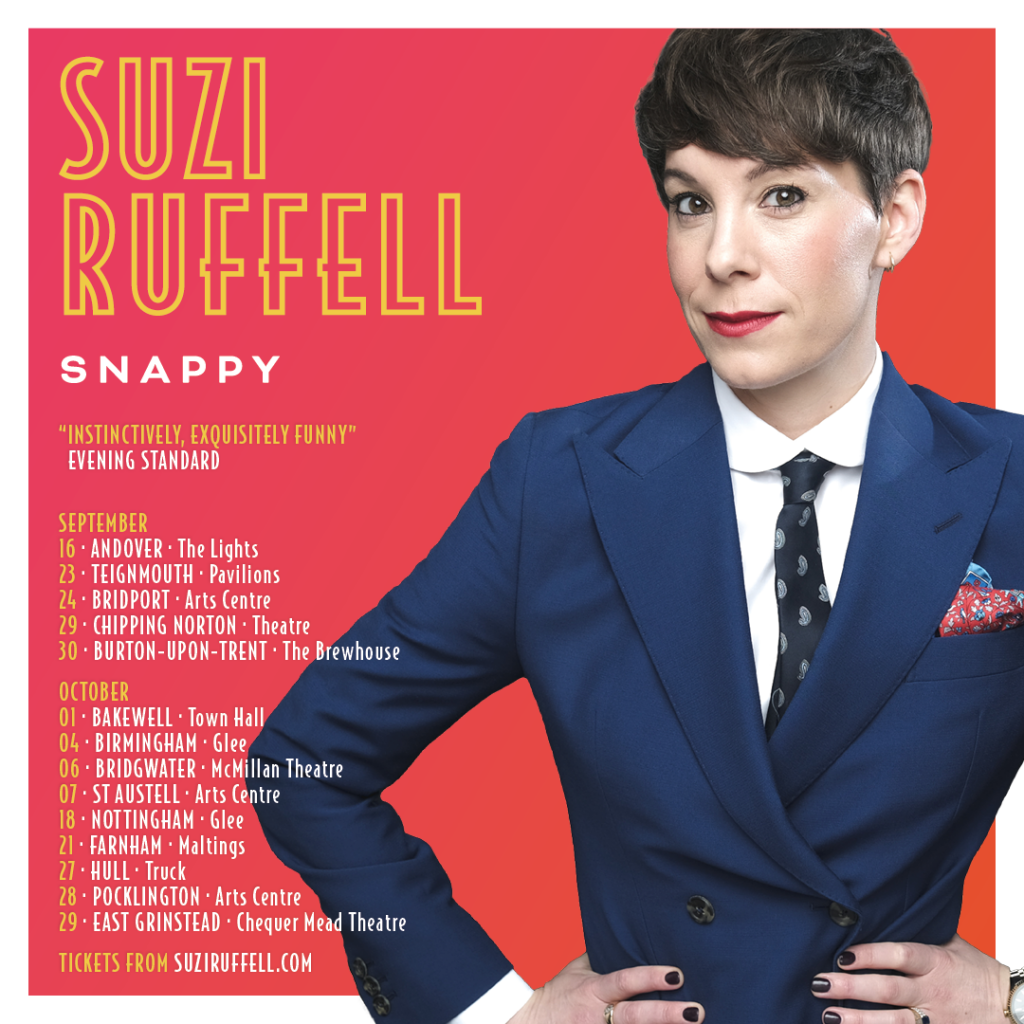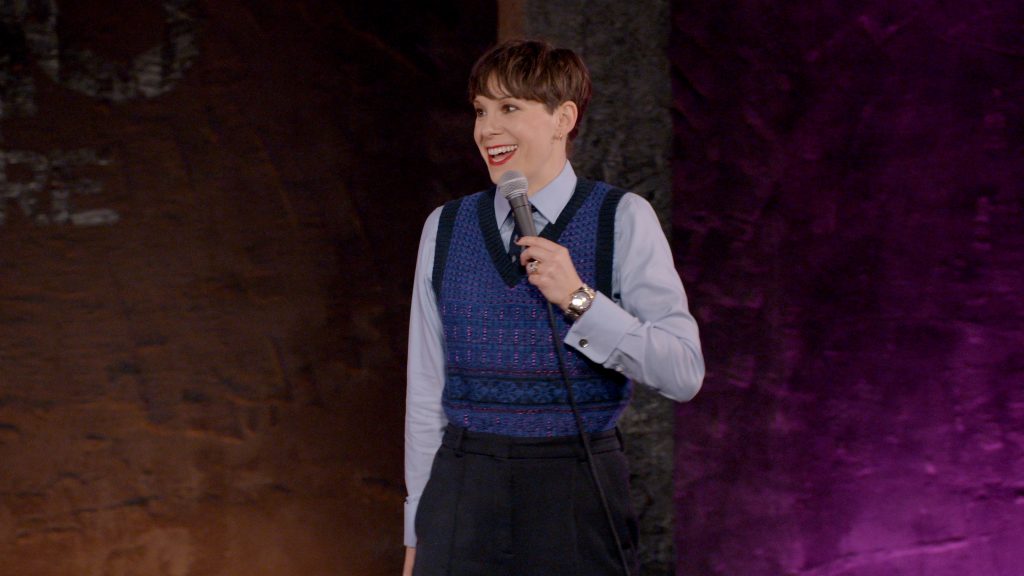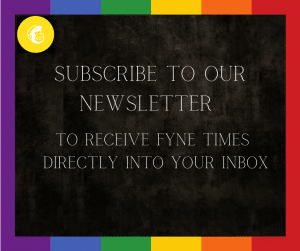Suzi’s brand-new show is all about settling down (but not settling), becoming a mother (without becoming mumsy) and still worrying about everything – of course she is – have you seen the news? We caught up with Suzi to chat about the upcoming show, Snappy, as well as this post-pandemic anxiety, queer motherhood, and diversity in comedy.
So firstly, can you tell us a bit about your upcoming tour, Snappy?
It’s a show about lots of things really, it’s about my life which – like everyone’s – changed post-pandemic. Mine changed in one respect because I became more aware of how lucky I am and how much I love stand-up, I’m very excited to get back out on the road. I also became a mum during lockdown so that changed everything, but I didn’t want to write a show that was just about becoming a parent, I wanted to write a show about lots of things like I normally do. The pandemic – which drew out an anxiety in me that I felt like I had gotten hold of – combined with a baby, made me realise I’m still quite an anxious person. I’m certainly not the first comic to talk about being anxious but I think it’s important to highlight that the pandemic has had these lasting effects on people, and that’s where the show starts. Some of the show is then about becoming a queer mum, which is definitely part of the reason that we have moved the Brighton, because I really want to be surrounded by other queer parents.

Touching on some potentially hard-hitting topics in your show, combined with the fact that the news is releasing new ways we might die every day could mean it’s quite difficult to keep things light in your comedy – do you find that?
For me, I want people to come to my shows and leave feeling lighter and uplifted. Poking fun at the government is quite easy at the moment, and I will of course touch on the things that are happening in the world, but quite a lot of the stand-up and storytelling I do is poking fun at myself. Because I have a really wide and broad audience, there will be people in the room who had similar childhoods to me and there will be people who had similar adulthoods to me, or they might be queer, or they might just feel slightly outside of the norm which is how I feel. It’s about finding the light in all of that and coming together and laughing is a great way to do that.
I often get people coming along to my shows who have just seen me on Mock The Week or The Last Leg and they don’t know an awful lot about me and I might talk about, for example, how hard it was for my wife and I to find a place to go on our honeymoon because there are so many countries where it’s illegal to be gay, and some people in the audience have never had to experience that. Most tour shows I’ll have someone come up to me – a straight person – and go, ‘I’ve never thought about that.’ But I never want to be like, ‘You don’t understand’, I want to be like ‘I bet you didn’t know this.’
So, starting a conversation as opposed to setting out to educate?
Precisely. People sometimes say that comedians are modern-day philosophers, but I don’t know, maybe we should look to philosophers for that instead of people doing dick jokes to make drunk people laugh at 11 in the comedy club. My shows are never telling people things it’s more about sharing things with people. That’s also the kind of comedy that I like too. I’ve got a bit in the new show where I talk about the fact that I used to have really long hair and the reason that I have really short hair now is partly because I want to be a cool chic lesbian but also because I would be really worried that I would leave my straighteners plugged in and I would burn the house down. I used to take a photo of them out of the plug and I thought when I said that on stage that no one would agree, but every single time I have done the show there has been a group of people who are like, ‘yeah I’ve done that.’ It’s all these little anxieties that we don’t talk about, or we worry that if we do, we’ll sound like we’ve lost our minds. I think bringing that up will hopefully make people feel better, I know I come back from tour feeling better.
Do you think that the comedy scene has become more of a diverse place?
Oh, 100%. When I started stand-up like 13 years ago, there would be like one girl on shows – if you were lucky – but very frequently none. It’s certainly got a lot better for women and I think it’s improving for queer people too, on the whole. I think there’s still a real lack of lesbians on TV though, and I would love for TV commissioners and controllers to take more chances with women who are queer. It seems that often the only queer women that are regularly on TV are sort of Clare Balding during sports, Sue Perkins and Sandi Toksvig – all of whom I love, but they’re also the same women that were on the TV when I was growing up, and it sometimes feels like TV has gone, ‘there are the three gay women, that’s enough.’ There might be a gay woman in a sitcom but as a smaller role which was clearly written by a man and that’s ok but it’s not ideal, so I certainly hope there are more opportunities for the rest of the community. I think we’ve heard a lot of experiences from the perspective of a straight man, and there are quite a few from gay men now too (although it would be great if there were more) but I think there’s room for everyone, and I would love to see that. There are a lot of queer acts at Fringe this year who are doing incredible stuff and I hope that as time moves there are more opportunities like that because I genuinely believe that it makes for more interesting programming.

Back when you were younger, did you have a role model within the LGBT community?
My role model was Mel C because she wore a tracksuit – that’s how starved I was of lesbian representation. I was like she can do a cartwheel and she likes sports, she seems gay. She’s a fantastic ally, but not gay – there wasn’t anyone to look up to really, I did look up to Sue Perkins who I now know a bit which is very cool, and Sandi Toksvig who is just the loveliest person. It’s incredible that I’ve met two queer role models who were on TV but it’s likely because there are so few of us.
Has the cost-of-living crisis put more pressure on performers as you know that buying tickets has become harder for people?
Many don’t have lots of disposable income at the moment, so when people come to see me, I want them to leave feeling glad they came. I wanted to keep my ticket prices as low as possible on this tour because first of all, I talk about being working-class on stage and I certainly don’t want to price out people from a similar community. I also know I have a young audience from podcasting – certainly from my podcast OUT – so it’s important they can come and see me. I know we are in a period of uncertainty so I think the tickets are £15 which is only a few pints, and hopefully, that means people come out and will feel like they got a real evening’s worth of entertainment and had a really good laugh. Maybe they’ll have stopped worrying about what they have been worrying about too, and can worry about what I’m worrying about instead.
Like that they’ve all left their hair straighteners on…
Yeah, the whole show they can be like fuck, my straighteners.
What do you practice as self-care when you’re not feeling your best?
I go for lots of walks whilst listening to podcasts, and I stop. That’s something which I find really hard to do because my brain is always going 100mph, so while it might sound really basic, I think just remembering to stop and breathe is important. More than anything though, when things get really on top of me, spending time with my wife or with people I care about really just helps me. I often let things snowball and catastrophise, so I often need to get back to what the actual worry is, and either work out how to fix it or accept that you can’t always fix it and that’s ok.

